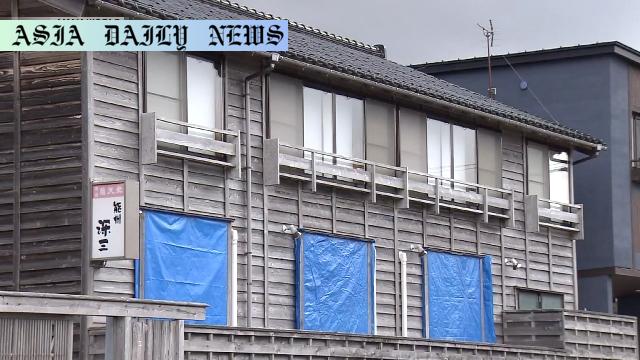Oku-Noto: About a third of accommodations in the quake-hit region of Ishikawa Prefecture remain closed, hindering tourism recovery.

Earthquake’s Destruction Reverberates Through Oku-Noto
The Oku-Noto region in Ishikawa Prefecture faced a significant blow to its economy and tourism following the devastating earthquake that struck on New Year’s Day last year. A once-thriving tourism hub, the region is now grappling with the aftermath of the quake, as damages to accommodations and critical services disrupted its primary economic driver. Tourist sites and lodging facilities, some of the mainstays of the regional economy, have suffered catastrophic setbacks.
A Sobering Reality: One Third of Hotels Remain Closed
According to a recent survey conducted over two weeks since mid-April, about one-third of the region’s accommodation facilities remain non-operational. Out of 109 surveyed hotels and inns across Wajima City, Suzu City, Noto Town, and Anamizu Town, 36 remain closed. The breakdown reveals 17 closures in Wajima City, 13 in Suzu City, four in Noto Town, and two in Anamizu Town. This highlights just how profound the damage is, with many facilities unable to resume operations due to extensive repair needs or operational constraints.
Despite Reopenings, Challenges Persist
Though more than half of the accommodations (63 out of 99) have reopened their doors, the situation remains far from ideal. Many facilities are not serving tourists but have become temporary accommodations for reconstruction workers and officials assisting local populations. This scenario underlines the longer-term struggle to reinvigorate tourism in the area. The lack of incoming visitors not only impacts business recovery but also stalls the revitalization of the region.
Balancing Recovery with Tourism Promotion
Local authorities in Ishikawa Prefecture face an unenviable dual challenge: restoring damaged infrastructure and reigniting interest among potential tourists. Reviving the once-bustling tourism industry demands coordinated efforts, substantial financial resources, creative marketing, and supportive policies. Ensuring that accommodations meet safety standards and providing incentives for tourists to visit are critical steps in reversing the economic downturn.
Broader Implications for Regional Economies
The challenges faced by Oku-Noto underscore the precarious position of regional economies that rely heavily on tourism. Natural disasters like earthquakes not only pose immediate physical threats but also create ripple effects that can linger for years. As evidenced in this case, the absence of tourists further exacerbates the sense of loss in a community already reeling from disaster impacts. Strengthening resilience and strategic economic diversification are important lessons for similar regions worldwide.
Looking to the Future
The journey ahead for Oku-Noto is both daunting and enlightening. As the region rebuilds, the resilience of its communities will play a pivotal role in creating a narrative of recovery. Initiatives to revitalize the tourism sector must align with broader disaster mitigation strategies to ensure long-term sustainability. By addressing the immediate needs for infrastructure restoration and balancing them with efforts to promote tourism, Oku-Noto can pave its way toward an optimistic future.
Commentary
Understanding Regional Challenges Post-Disaster
The ongoing situation in Oku-Noto reveals how vulnerable regional economies reliant on tourism can be in the face of natural disasters. The earthquake’s devastating impact has left accommodations and tourist sites—a core pillar of the area’s economy—in shambles. The fact that one-third of hotels and inns remain closed even after more than a year speaks volumes about the difficulty of rebuilding in such circumstances.
The Importance of Resilience in Tourism
Tourism is an essential driver for the local economy in the Oku-Noto region, but its heavy reliance on this single sector has proven to be a double-edged sword. The recovery from such situations not only requires physical reconstruction but also a robust plan to rebuild trust and attract tourists. While reconstruction workers and officials currently occupy reopened hotels, this is not a sustainable long-term solution for a region seeking to reclaim its former vibrancy.
Lessons for Other Tourism-Dependent Economies
The Oku-Noto experience should serve as a cautionary tale and a learning opportunity for other regions. Diversifying economies and implementing disaster-resilient infrastructure should be key priorities. Moreover, creating contingency plans to maintain at least a baseline level of operations during crises might reduce the long-term repercussions. Local governments must also ensure swift communication and funding processes to aid affected businesses.
Hope and Opportunity Ahead
Despite these challenges, there is hope. Revitalization efforts, coupled with thoughtful strategies for sustainable tourism, can potentially position Oku-Noto as a symbol of resilience. Marketing initiatives that focus on the beauty and uniqueness of the region while highlighting its recovery story can draw attention back to the area. Through community coordination, government aid, and strategic partnerships, Oku-Noto can turn its struggles into a testament to perseverance and adaptation.


